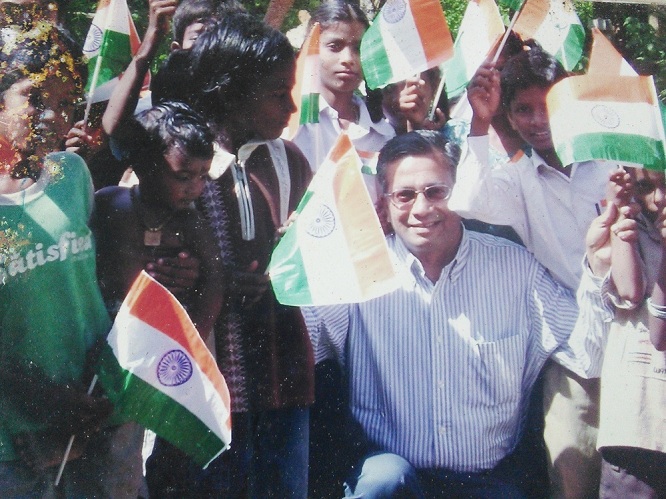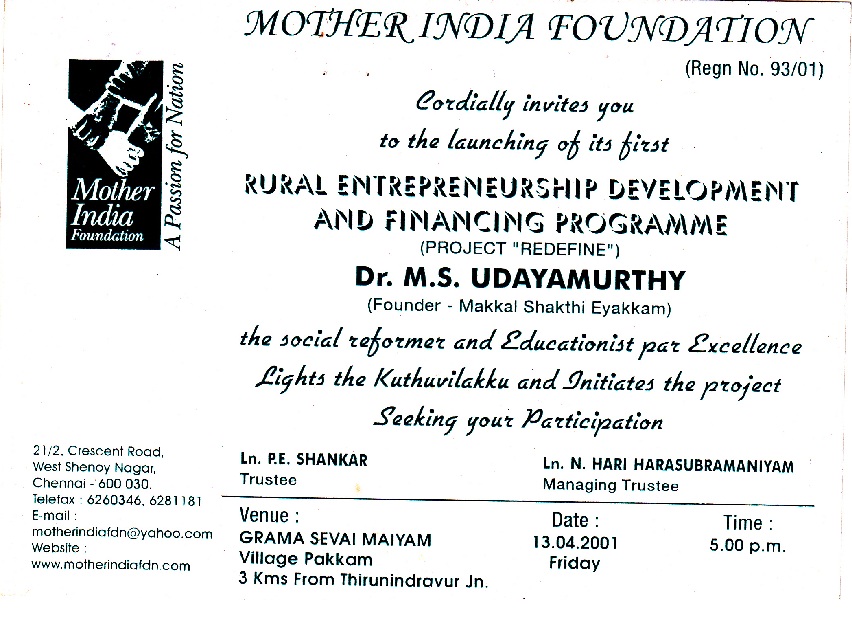THE MOTHER INDIA FOUNDATION (MIF) - N Harihara Subramaniyan

The Mother India foundation (MIF) is the result of the love that two friends have for their motherland.
N Harihara Subramaniyan, and P E Shankar, are the men behind this organisation, which aims to work towards networking like-minded people and NGOs, focussing on rural development.
These two successful businessmen wanted to give something back for their country and this is the way they chose to do it.
I come from a middle-income family. My father was a professor atPachaiyappa's College. I am the only son in my family and have three sisters. We were brought up in a highly religious atmosphere. At that time we were staying in a small house of 500 sq ft. If I am what I am today, a good human being, I owe it to my upbringing and am grateful to my parents.
I did my primary schooling at the Corporation School in Aminjikarai and then did my high school at the MCTM School in Purasawakkam. After completing my schooling I did a one-year course in the University. I then did my BE Mechanical.
I got started at TAFE where I worked for 5 years. My stint at TAFE gave me a lot of opportunities to meet various experts in the industry and I felt confident enough to start my own business.
When I started my own business I had a lot of spare time on my hand. I felt that I needed to use that time to do some good. It was at that time that I came across Vivekananda Educational Society. I was also a member of the Lion's Club of Chennai, Shenoy Nagar.
In 1980, we visited Vivekananda Vidyalaya at Korattur as part of our activity at the Lion's Club. I was very much impressed with the way the school was run. After a few days I met the Secretary of the Vivekananda Educational Society. I volunteered to offer any help that I could. I was invited after a few days to a committee meeting where it was decided that I would help out the Anna Nagar School, so that I would not have to travel far. I was around 26 years old at that time. After a few years I was made Honorary Correspondent - a post, which I held for 10 years.
In the 10 years that I was there, I used all the skills that I had acquired through my work experience to collect funds and develop the school. I collected funds to the tuneof Rs 25 lakh. Using these funds I raised two buildings. I also raised a block of excellence meant only for practical learning of subjects with excellent facilities like a swimming pool and tennis court. This was my first stint in actual service to society.
I resigned the post in 1990 to focus on my company.
Individually all along I had been helping a lot of youngsters and very poor students; getting them employment opportunities, funding their studies and so on. I realised that it was about time I graduated from helping individuals.
I wanted to do something for national resurgence. I wanted to know what great leaders like Dr Radhakrishnan, Gandhiji and so on had said about national resurgence. In this context, I started collecting and reading various books written by our great leaders. In fact I have a collection of over 1000 books written by these great leaders. I learnt two things- one is, the future of the country is in children and the other that the core strength is in villages. Only if we make our villages self-sufficient will our country grow stronger. I decided to make these two the target group.
A small effort in a cluster of about 10-11 villages, spread over three years is enough to bring about change. Having decided on this, I wanted to take on somebody to work along with me. Shankar was the ideal choice. We had known each other for a long time, as we were both in the Lion's Club. In all of my individual projects or large projects he was there both physically and financially with me. He is also very religious and one step ahead of me when it comes to charity. When I wanted to set up a foundation and a trust, he was the right partner. Mother India Foundation was registered earlier this year with myself as Chairman of the foundation and P E Shankar, as the Co-trustee of the Foundation.
We are looking for the right kind of people who can work with us but are in no hurry and are willing to wait until the right person comes by.
I believe that the right circumstances develop by themselves and the way sets accordingly. We were lead to the present villages that we have identified through contacts.
We went to Pakkam and found a youngster there running a school and he had similar aspirations. We went on to the nearby villages and within a span of 4 - 6 weeks we identified youngsters from every village. We found that the youth were more enterprising than men.
We are looking at three things - employment, children's education and medical facilities.
We plan to give
'Project Kalaimagal'
is a night school cum support centre for children. It will have four centres covering eleven villages benefiting about 700 students. All basic needs of these centres have been met with by local youth as well as by our volunteers.
'Project Redefine'
is a rural entrepreneurship development and financing programme for youth and women. The very first project as part of this programme gave employment to two women and five young men, who are actively working with us. It was launched on April 13th 2001 at Pakkam Village, with an investment of Rs 50,000/- and ensures a minimum earning of Rs 1500/- per month to each of them.
'Project Nalvazhvu'
is a village welfare scheme where we will be taking doctors, veterinarians, soil technologists and other experts to interact with the villagers during the weekends. And as we go further, we plan to establish a centre where these experts will be made available for the villagers to meet. 'Project Akshaya' is to inculcate the habit of small savings among the people.
We also had a special project between 22nd Feb to 3rd March 2001, where we sent a relief team to Gujarat. For this purpose MIF joined hands withSuyam Charitable Trust to help the cause of the earthquake affected people in Gujarat.
Ultimately for any self-service project to sustain itself and become a success it should generate money and become a closed loop. We expect the villages to become self-sufficient over a period of 2 - 3 years, produce more through the 'Redifine program', have surplus capacity and the children should be doing well in their studies.
This is where we want to differ. After putting our heads down and working in these 11 villages, we will draw up what we have leasrnt and we plan to set up a centre called the 'Indian Institute of Rural Development'.
We propose to form a one-year course where the youngsters will study subjects like horticulture, health and hygiene, construction, co-operative production techniques and get to know about various funding schemes available under State and Central ministries and under the National Board for Agricultural and Rural Development (NABARD). They will also be taught basic counselling skills and also to settle disputes so that they can handle things by themselves. We plan to draw youngsters to attend this course from villages throughout the state. It will be like 5 days of classes and they will be sent out on weekends to apply practically what they have learnt. We plan to take in 30 to 40 youth representing about 15 villages. After the course they will be required to take up projects in their villages. We will also set up 'Technology Cells' and invite people with technological expertise and with their knowledge pass on low tech production processes and techniques to villagers and help set up small scale industries.
We will try to fine tune the course material based on our experience and replicate these centres and if we can reach 2 % of our target of 80,000 villages, that is 1600 villages.
We are thus likely to see a 'Ripple effect' and in 15 - 20 years we are sure to see a lot of change. If this is successful in the next 20 years, then naturally others would want to adopt the same model and the results are likely to be reproduced in other parts of the country. This is what we hope to achieve.
